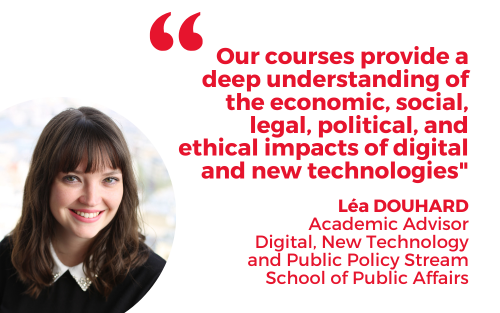Léa Douhard is the Academic Advisor for the Digital, New Technology and Public Policy stream at the School of Public Affairs. Sciences Po Careers asked her about the programme’s curriculum, the skills it teaches, and the career opportunities it leads to.
Can you give us an overview of the Digital, New Technology and Public Policy stream at the Sciences Po School of Public Affairs?
Léa Douhard - The Digital, New Technology and Public Policy stream is open to any student enrolled in the Master in Public Policy or the Master in European Affairs at the School of Public Affairs. It offers an interdisciplinary curriculum, delivered in English by Sciences Po faculty and practitioners from the digital technology sector. The courses give students a deep understanding of the economic, social, legal, political, and ethical impacts of digital and new technologies (data, artificial intelligence, algorithms, machine learning tools, etc.).
There are no technical prerequisites for this policy stream, but it is important that students understand what lies “behind” the theory. Consequently, the programme also enables students to acquire a set of core practical skills (programming, data analysis and visualisation, etc.) that will enhance their capability to lead and manage digital transformation projects in the public and private sectors.
What are the main skills expected of future talent in the digital technology sector?
L.D - I always tell students that the most important thing is to be able to keep learning on their own after they graduate! Things move extremely fast in the digital technology industry. You have to constantly update your knowledge and be able to assimilate it in a critical and constructive way in order to ask the right questions and make informed decisions.
Still, in terms of skills, the policy stream is based on four pillars:
- Regulate: learning to analyse, implement, and evaluate economic and standards-related measures to regulate the digital technology sector at national, European, and international level
- Make: learning to decipher and use data and technology to improve decision-making and design ethical, useful public policies
- Innovate: understanding how digital technology can help design relevant services that will really improve the lives of citizens in all areas (education, health, culture, housing, etc.)
- Transform: being able to anticipate and adapt to the future consequences of digital technology in the different spheres of society and manage digital transformation projects accordingly.
What are the main career prospects for this policy stream?
The career opportunities are diverse:
- In the public sector, graduates can lead digital transformation projects in government departments, government agencies, or local government, work on issues related to digital regulation in government departments (e.g., the General Directorate for Business at the Ministry of the Economy and Finance) or in regulatory authorities such as the CNIL, ARCEP or their international equivalents. Graduates can also work for European institutions (e.g., European Commission, Parliament) or international organisations (OECD) as many decisions on digital technology policy issues are made at these levels.
- In the private sector, graduates find positions in large consulting firms (e.g., Capgemini, Bearing Point, APCO Worldwide, etc.), specialised lobbying firms, and the public affairs departments of large tech companies (e.g., Microsoft, Google, IBM, etc.), but also doing specific assignments for companies in other sectors dealing with the digital revolution (health, cybersecurity, education, etc.). Graduates can also work in the startup ecosystem, either directly for startups or for organisations that support their development (e.g., France Digitale, French Tech, etc.).
- In the nonprofit sector, graduates can work for think tanks, NGOs or nonprofits involved in digital rights advocacy (e.g., Emmaus Connect). Some graduates also continue in academia (research assistant, PhD student, etc.).
If you had to define a Digital graduate in one word?
Future-oriented!
Any advice for someone wanting to apply for this policy stream?
L.D - If you have an interest or curiosity in digital technology issues, go for it! Students often fear that such a specialisation will restrict their future career choices, but in fact the opposite is true. Today, there is not a single industry that is not affected by the digital revolution, and the major societal issues we face can only be solved by decision-makers with the necessary skills to understand and act in the digital age. So in fact it’s a very broad policy stream that offers you a way to stand out and add real value to your future CV.
FIND OUT MORE

